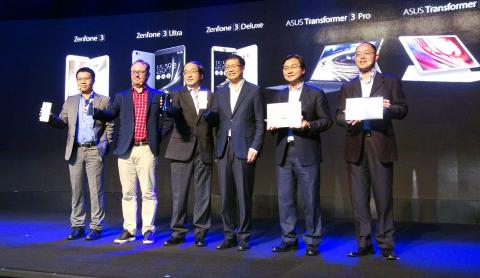Asustek Computer Inc (華碩), the world’s fourth-largest PC vendor, is accelerating the development of its robotic and virtual reality (VR) segments to offset the continued weakness in the PC and tablet businesses.
Asustek’s tablet unit used to contribute more than 20 percent of the company’s total revenue, and the employees of the unit account for more than 10 percent of the firm’s total headcount, but the tablet business is declining faster than the company’s estimate, Asustek chief executive officer Jerry Shen (沈振來) said.
“We have been reallocating resources, engineers and software developers from our tablet unit to the robotics, VR and AR [augmented reality] teams to enhance the new businesses,” Shen told reporters after an investors’ conference on Friday.

Photo: CNA
To step up development of Asustek’s first robot, Zenbo, the company held a software development conference last week to call on outside developers to join the team to enrich Zenbo content, Shen said.
Asustek plans to launch the product in Taiwan at Christmas this year and on the Chinese market in the first quarter of next year, Shen said.
Zenbo is scheduled to arrive on the US market by the second quarter of next year, Shen said.
“Shipments of Zenbo are likely to pick up from the second quarter of next year and make sales contributions,” he added.
In addition to robotics, Asustek sees the growing VR and AR industries as part of the company’s growth drivers, Shen said.
Shen said Asustek plans to unveil total solutions for VR — a headset and joystick bundle with Asustek’s desktop — at the Consumer Electronics Show in Las Vegas next year.
Asustek’s VR total solutions is likely to be similar to Sony Corp’s PlayStation virtual reality console, though Asustek’s package might cost more than its Japanese counterpart, Shen said.
However, the price will be competitive because Asustek’s product can be used as a desktop computer, while Sony’s PlayStation is only a game console, Shen added.
The company also wants to differentiate its VR applications from content platforms, Shen said.
Asustek is in talks with mainstream VR content platform providers, such as SteamVR, Oculus and Tencent VR (騰訊), to jointly build content for Asustek’s VR solutions, Shen said, adding that the company is also mulling developing its own games.
While the company’s package is to be PC-based, its AR solutions are to be mobile-based, Shen said.
The company is collaborating with an international company to build mobile AR applications, Shen said, adding that its first AR application is likely to be similar to Pokemon Go.

The Eurovision Song Contest has seen a surge in punter interest at the bookmakers, becoming a major betting event, experts said ahead of last night’s giant glamfest in Basel. “Eurovision has quietly become one of the biggest betting events of the year,” said Tomi Huttunen, senior manager of the Online Computer Finland (OCS) betting and casino platform. Betting sites have long been used to gauge which way voters might be leaning ahead of the world’s biggest televised live music event. However, bookmakers highlight a huge increase in engagement in recent years — and this year in particular. “We’ve already passed 2023’s total activity and

BIG BUCKS: Chairman Wei is expected to receive NT$34.12 million on a proposed NT$5 cash dividend plan, while the National Development Fund would get NT$8.27 billion Taiwan Semiconductor Manufacturing Co (TSMC, 台積電), the world’s largest contract chipmaker, yesterday announced that its board of directors approved US$15.25 billion in capital appropriations for long-term expansion to meet growing demand. The funds are to be used for installing advanced technology and packaging capacity, expanding mature and specialty technology, and constructing fabs with facility systems, TSMC said in a statement. The board also approved a proposal to distribute a NT$5 cash dividend per share, based on first-quarter earnings per share of NT$13.94, it said. That surpasses the NT$4.50 dividend for the fourth quarter of last year. TSMC has said that while it is eager

Nvidia Corp CEO Jensen Huang (黃仁勳) today announced that his company has selected "Beitou Shilin" in Taipei for its new Taiwan office, called Nvidia Constellation, putting an end to months of speculation. Industry sources have said that the tech giant has been eyeing the Beitou Shilin Science Park as the site of its new overseas headquarters, and speculated that the new headquarters would be built on two plots of land designated as "T17" and "T18," which span 3.89 hectares in the park. "I think it's time for us to reveal one of the largest products we've ever built," Huang said near the

China yesterday announced anti-dumping duties as high as 74.9 percent on imports of polyoxymethylene (POM) copolymers, a type of engineering plastic, from Taiwan, the US, the EU and Japan. The Chinese Ministry of Commerce’s findings conclude a probe launched in May last year, shortly after the US sharply increased tariffs on Chinese electric vehicles, computer chips and other imports. POM copolymers can partially replace metals such as copper and zinc, and have various applications, including in auto parts, electronics and medical equipment, the Chinese ministry has said. In January, it said initial investigations had determined that dumping was taking place, and implemented preliminary